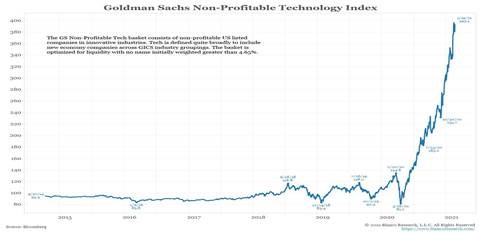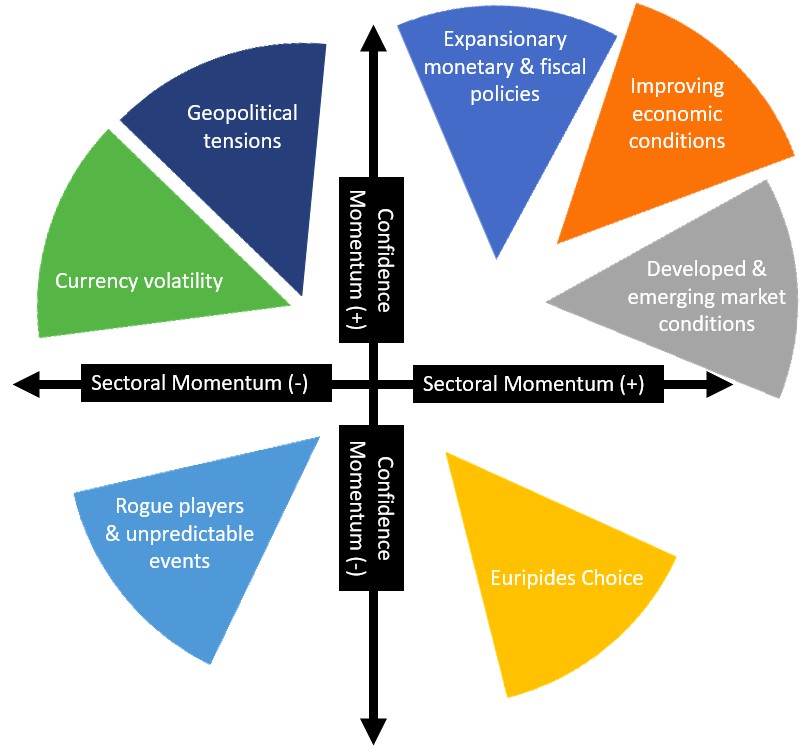In our commentary two weeks ago, we described how the confidence and sectoral momenta interact and create the four quadrants of market expectations. In that same commentary we also presented eight forces (consumer confidence, monetary conditions, fiscal conditions, currency volatility, stochastic & rogue factors, stability in developed & developing markets, and geopolitical tensions) which, in our view, are among the most important ones that shape the market’s trajectory under the current circumstances.
In today’s commentary we conclude that discussion by inserting the slices of those eight forces into the four quadrants, in order to explain our assessment of the markets for at least the first few months of the year. As we endeavor into this exercise, we recall the ancient tragedians as they were competing for prizes in festivals where their tragedies were presented as didactic venues to educate and prepare the public of things that may be unraveling in their collective lives.
When I am thinking of those ancient tragedies, my mind, several times, goes to Mozart and his opera Lucio Silla where a Roman dictator finds redemption for himself and his people when he allows virtue to overcome hunger for power and glory. Such redemption in Mozart’s opera – which is synonymous to liberty for the people – resembles the tragedians’ moment of redemption when their heroes are liberated and redeemed. Since we discussed Sophocles in the previous commentary, allow us please to say a few words about his play Philoctetes. The play has the classic moral conflict and dilemmas of Greek tragedies. At the start of the Trojan War, Philoctetes is marooned by his fellow fighters on an island due to an incurable wound. Achilles was dead and Philoctetes controlled a magic bow that the Greeks needed in order to capture Troy. The ever-Machiavellian Odysseus and Neoptolemus (who is Achilles’s son) come to get the bow. Odysseus is strategizing using deceit. Neoptolemus, on the other hand, is a young man with scruples. The moral conflict ends happily with the deus ex machina appearance of Heracles who proclaims that Philoctetes will be cured and earn glory at Troy. The central banks nowadays seem to be playing the role of the deus ex machina.
We are assessing, nowadays, the investment landscape where Odysseus in his ever-Machiavellian strategic mind thinks of ways to use Reddit in order to promote GameStop and Neoptolemus evaluates the moral implications of such strategy. While we are watching on the stage a transformed dictator (Lucio Silla) who comes to himself and comprehends the power of freedom from insecurities along with the liberty of the soul and mind that a person finds when citizenship comes before personal gain, we are wondering when the people of Russia and China (with such great histories) will experience the uplifting forces of liberation from dictators who oppress their God-given dignity and potential.
Odysseus discusses the geopolitical tensions which may dictate regulatory, energy, and exchange rate policies and which probably point to the upper left quadrant. Neoptolemus wants us to consider the expansionary monetary and fiscal policies, along with rising demand and consumer confidence at a time when vaccinations are picking up pace. His assessment puts us in the upper right quadrant. Lucio Silla sees potential threats from rogue players and searches for the unpredictable factors that could bring havoc into the markets (after all there was a conspiracy against him from his arch-enemy Senator Cecilio). Silla’s views point us to the lower left corner/quadrant. And then, as the sense of wandering seems to be elevating, Euripides shows up with his Bacchants/Bacchae play.
The play is one of the greatest tragedies ever written in ancient or modern times. The innovations it introduces are unique. A god (Dionysus) appears as a character in the play who even speaks the prologue. The mother of King Pentheus (Agave) along with the other women/maenads of Thebes in their crazy and irrational condition, tear apart the King. King’s Pentheus sin? Resisting the cult of Dionysus. The latter punished the women of Thebes who disbelieved in his power and divinity by making them insane and sending them to the mountains. King Pentheus thinks of those women as persons of licentiousness. The chorus is made up of Dionysus’s followers who traveled to Thebes with him from Asia and Euripides’s innovates by making them part of the plot.
The play seems to declare the limits of rationality as well as of irrational behavior. Euripides digs into the dark roots of our drives and explores the wilder shores of our expectations and experiences (see graph below), fusing human and divine into an entrancing and charming vision.

Euripides in his pre-Hegelian mind synthesized the other two great tragedians (Aeschylus and Sophocles) and proposed that we tune down expectations and fears, suggesting that for the next few months we may be settling to the lower right quadrant.

And as I was about to draft my conclusion, my oldest daughter called reminding me that the tune we were dancing to when she was a baby and to which we also danced to just about a year ago on her wedding day, is not just The Walk of Life but a stochastic path to the End of the Line.
